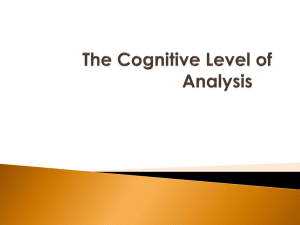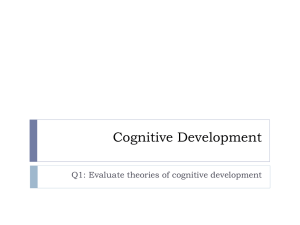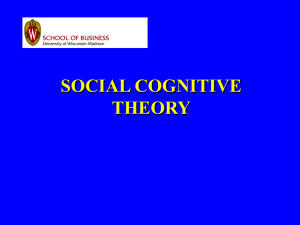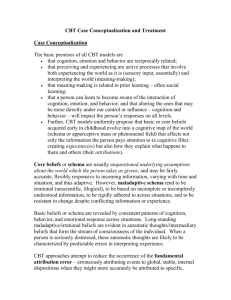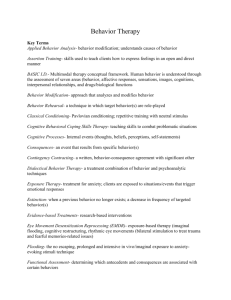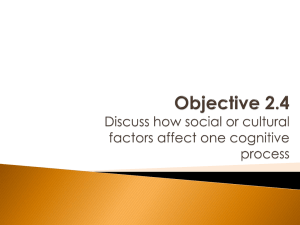cbt
advertisement
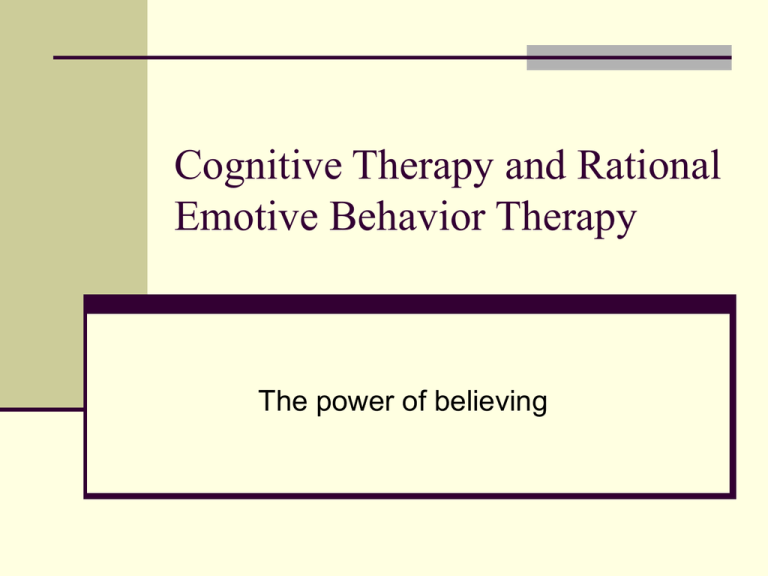
Cognitive Therapy and Rational Emotive Behavior Therapy The power of believing Theory of Personality (REBT terminology in parentheses) Cognitive states are the fundamental component of personality Emotions and behaviors are based on schemas (beliefs) Schemas are cognitive perceptions, interpretations, and assumptions that individuals use to help organize and make sense of their experience Schemas can either be functional or dysfunctional (irrational) and can compete with each other Dysfunctional schemas predispose people to psychological distress. The impact of our thoughts Nature of Maladjustment Maladjustment (i.e., maladaptive, self-defeating behaviors) stems from irrational beliefs and distorted cognitions (next 2 slides). Maladaptive cognitions come from: Early (and earlier!) experiences Selective attention Misperception Maladaptive focusing Repertory deficiencies Cognitive Therapy and REBT differ in their emphasis on specific cognitive content REBT: “musts”, “shoulds”, and other imperatives underlie all disorders. CBT: Cognitive profiles of depression, anxiety, and panic are different and require different techniques Adaptive behaviors come from self-enhancing thoughts. Clients can be taught to shift from maladaptive (irrational) thoughts to self-enhancing thoughts. 12 Irrational Ideas That Cause and Sustain Neurosis (1-6) 1. I need love/approval from those significant to me and must avoid disapproval from any source. Alternatives 1. Love/approval are nice but unnecessary 2. To be worthwhile as a person I must succeed at everything and make no mistakes. 2. Unfailing success and competence is unrealistic and I accept myself as a person, separate from my performance 3. People should always do the right thing. When they behave obnoxiously, unfairly or selfishly, they must be blamed and punished. 3. People unfortunately sometimes do bad things, but getting upset won't change that 4. Things must be the way I want them to be - otherwise life will be intolerable. 4. Things won’t always be the way I want. It's disappointing, but there is no need to catastrophize 5. My unhappiness is caused by things outside my control - so there is little I can do to feel better. 5. Many external factors are outside my control, but it is my thoughts which cause my feelings 6. I must worry about things that could be dangerous, unpleasant or scary otherwise they might happen. 6. Worrying about things that might go wrong won't stop them happening. It will, though, ensure I get upset right now! 12 Irrational Ideas That Cause and Sustain Neurosis (7-12) 7. I can be happier by avoiding life's difficulties, unpleasantries, and responsibilities. 8. Everyone needs to depend on someone stronger than themselves. 9. Events in my past are the cause of my problems - and they continue to influence my feelings and behaviors now. 10. I should become upset when other people have problems and feel unhappy when they're sad. 11. I should not have to feel discomfort and pain - I can't stand them and must avoid them at all costs. 12. Every problem should have an ideal solution, and it is intolerable when one can't be found. Cognitive Distortions Arbitrary inference: Drawing a conclusion without supporting evidence or despite contradictory evidence (I’m a terrible mother) Selective Abstraction: Drawing conclusion based on detail taken out of context (Jealous when girlfriend stands close to another man) Overgeneralization: Drawing a general conclusion based on one or a few isolated incidents (All men are jerks) Magnification/Minimization: Seeing something as much more or much less significant than it really is Personalization: Attributing external events to self without evidence of supporting connection Dichotomous thinking: Categorizing experiences into one of two extremes (success or failure) The case of Alan Alan is a young man who had always tended to doubt himself. Alan imagined that other people did not like him and that they were only friendly because they pitied him. One day, a friend passed him in the street without returning his greeting - to which Alan reacted negatively. Here is the event, Alan’s beliefs, and his reaction, put into the ABC format A. Antecedent: Friend passed me in the street without speaking to me. B. Beliefs about A.: 1. He’s ignoring me. He doesn’t like me. 2. I could end up without friends for ever. 3. That would be terrible. 4. For me to be happy and feel worthwhile, people must like me. 5. I’m unacceptable as a friend - so I must be worthless as a person. C. Consequence: Feelings: worthless, depressed. Behaviors: begins (continues) to avoid other people. A different person… A. Antecedent: Friend passed me in the street without speaking to me. B. Beliefs about A.: 1. He didn’t ignore me deliberately. He may not have seen me. 2. He might have had something on his mind. 3. I’d like to help if I can. C. Consequence Feelings: Concerned. Behaviors: Goes to visit friend to see how he is. Strategies for Helping Clients Collaborative empiricism, Socratic dialogue, and guided discovery (REBT: confrontation) Cognitive Modeling: The therapist models with self-talk cognitions that the client will incorporate. Covert Modeling: A client imagines engaging in the desired behaviors he or she wants to learn or adopt. Thought Stopping: Interruption of unwanted thoughts when they occur by shouting “stop” whenever the unwanted thought pops into consciousness. Cognitive Restructuring: Replacement of irrational, maladaptive thoughts with rational and adaptive ones. Decatastrophizing Reattribution Redefining/reframing Decentering Stress Inoculation: Teaching clients both cognitive and physical skills for coping with future stressful and distressing situations. Obstacles to change Personal change means giving up some old habits of thinking and behaving and 'safe’ ways of approaching life. Change involves risk, which can increase stress and emotional pain - temporarily. In other words, people may well feel worse before they feel better. “I can’t stand it” “Change should happen naturally; I shouldn’t have to work at it” “There is a faster/easier way to change” “Choosing how I feel makes me a phony” “Choosing how I feel will make me cold and unemotional Disadvantages of Cognitive Therapy Harshly judged by feminists and multiculturalists because it implicitly mirrors masculine and EuroAmerican worldviews and does not adequately take culture into consideration. The therapist needs to not only understand cognitive techniques but also have a vast understanding of behavioral and learning theories. The therapist needs to have strong discipline and there is less tolerance for error.


